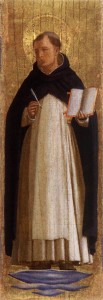 St. Thomas was born at Roccasecca, Italy in 1225. His early education was entrusted to the Benedictines in Monte Cassino where it was hoped he would eventually join the community. In his mid teens, he was sent to the University of Naples to complete his studies. Here he became attracted to the way of life of the recently founded Dominicans and, against the wishes of his family, joined them in 1244. The Dominicans were already established in several European cities and Thomas studied in Cologne under St. Albert the Great.
St. Thomas was born at Roccasecca, Italy in 1225. His early education was entrusted to the Benedictines in Monte Cassino where it was hoped he would eventually join the community. In his mid teens, he was sent to the University of Naples to complete his studies. Here he became attracted to the way of life of the recently founded Dominicans and, against the wishes of his family, joined them in 1244. The Dominicans were already established in several European cities and Thomas studied in Cologne under St. Albert the Great.
An ardent seeker of truth. Thomas contemplated it and imparted it to others through writing, teaching and preaching. Intellectually, it was a time of great upheaval and a reawakening of interest in the Greek philosophers and Thomas succeeded in integrating Aristotelian thought into Christian thinking. Eight centuries after its completion, his Summa Theologica still challenges and inspires. So much intellectual success, far from alienating Thomas from his Creator, drew him even closer to God. Commissioned by Pope Urban IV to compose a liturgy in honour of Corpus Christi, Thomas’ love of the Eucharist, his faith and his wisdom found expression in the hymns still sung throughout the universal Church – Pange Lingua and Adoro Te Devote.
Declared Patron of all Universities and Catholic Schools by Pope Leo XIII, educators will find much to challenge them in St. Thomas’ work, De Magistro (The Teacher). His emphasis on the qualities, character and vision of the teacher as an influence on the style and content of teaching are as valid today as in his time. The students, he says, are free yet amenable to ideals presented to them but they are their own character architects. St Thomas himself was the living exemplar of the gospel value “The truth will make you free”.
At the age of 49, he died on his way to the Council of Lyons in 1274.
Extracted from: In Search of Truth; The Dominican Way in Education

